|
|
|
Sort Order |
|
|
|
Items / Page
|
|
|
|
|
|
|
| Srl | Item |
| 1 |
ID:
141385
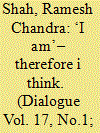

|
|
|
|
|
| Summary/Abstract |
The unprecedented explosion of knowledge in all fields on the one hand, and the virtual magic of I.T. revolution on the other would appear to have changed everything in our life-world. Most of us remnants of the older generation feel somewhat dazed and challenged by the new dispensation, replacing knowledge by knowledge-industry; books by ebooks; & education by the new-fangled phrase human resources. Management is the key word now: management gurus preside over all developments of culture today – rendering not only pure intellectuals, but even what was once called sage-mind irrelevant and superfluous. How with this rage shall Beauty or even what a great twentieth century poet called ‘The commonsense of the soul,’ hold a plea?
|
|
|
|
|
|
|
|
|
|
|
|
|
|
|
|
| 2 |
ID:
141397


|
|
|
|
|
| Summary/Abstract |
Since independence, the government of India has been taking various policies to reach the financially untouched people of rural India. Now the question that comes up is, are these policies successful for reaching the financially untouched people of rural Assam? The present article tries to concentrate on this. The author found the ineffectiveness of various rural credit policies like Branch Expansion Policy, Lead Bank Scheme, Self-Help Group Bank Linkage Programme, Kisan Credit Card Scheme, General Credit Card, No-Frill Accounts, Business Correspondent, and using technology like Biometric Card, Mobile Banking etc. in rural Assam. The paper also raises concern over the new financial inclusion policy “Prime Minister Jan Dhan Yojana, 14” in rural Assam. Furthermore, the author recommended a separate financial inclusion policy for rural Assam which may be different from the mainland India credit policy.
|
|
|
|
|
|
|
|
|
|
|
|
|
|
|
|
| 3 |
ID:
141396
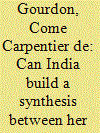

|
|
|
|
|
| Summary/Abstract |
According to the present western-inspired model for socio-economic and political organization, whether liberal or social-democratic, traditional cultures are only tolerated as aesthetic props, as long as they don’t contradict the limits or restrict the scope of secular modernity. As mainstream economists like to say: “there is no alternative” (TINA)…to the path blazed by the West.
|
|
|
|
|
|
|
|
|
|
|
|
|
|
|
|
| 4 |
ID:
141382
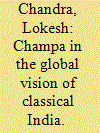

|
|
|
|
|
| Summary/Abstract |
The foundation and flourishing of Champa on the major marine trade route from Kanchi to Canton, or from the SE Asian isles to Canton, was part of a new historic phenomenon of the fast emergence of cultural kingdoms from tribal orders. The new paradigm was the empowerment of the dormant energy of the non-alphabetic tribes by enriching them with a writing system and thinking patterns; establishing kingdoms with a king, ministers, nobility and State functionaries; setting up palaces and temples; the rise of an intellectual class and priestly orders. Emperor Asoka sought the substitution of war drums by the drums of Dharma, bherighosa became dhammaghosa. He initiated this process of culturation by sending his son Mahendra and his daughter Sanghamitra to Srilanka by deputing his ministers to Khotan and crowning his son as the first “King of Khotan,” by planning his son Kunala to be the King of Kucha, and so on. This sowing of intellectual seeds in the immensity of the regions was the rise of a new order of a spiritual culture and secular civilisation in the whole of Asia. The theodiversity, pluralism of life styles, alongwith an organised state, economy and strategic systems of India became the dawn of a new age in the SE Asian region upto mainland China. Indian savants, princes and merchants envisioned Suvarnadvipa in their quest of affluence of life.
|
|
|
|
|
|
|
|
|
|
|
|
|
|
|
|
| 5 |
ID:
141383
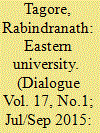

|
|
|
|
|
| Summary/Abstract |
In the midst of much that is discouraging in the present state of the world, there is one symptom of vital promise. Asia is awakening. This great event, if it be but directed along the right lines, is full of hope, not only for Asia herself, but for the whole world.
|
|
|
|
|
|
|
|
|
|
|
|
|
|
|
|
| 6 |
ID:
141391


|
|
|
|
|
| Summary/Abstract |
The idea of modern think tank is largely a western concept. Historically, its roots could be traced in the British society, which gradually extended to the United States of America. Subsequently, it has spread all over the world, predominantly in Europe. It is to be noted that even in the ancient world of the Orient and Occident have had their own think tanks like Kautilya, Platonic Academy and Ashrams of Vedic and Upanishadic sages. Old academia largely grew around the thought processes and personality of a single individual like Socrates, Plato, Aristotle, Kautilya and a number of saints and sages. The saints and sages of the medieval times also fall in the same category. Some of the great thinkers, whose thought processes led to transition of Europe from medieval to modern times, had their own contributions in the entire process. In the subsequent period, some of the discoveries and inventions, which led to the emergence of modern industrial civilization, were also the result of individual efforts. At still later stage, seminal thinkers like Karl Marx, Sigmund Freud, Albert Einstein, Gandhi et al influenced the minds and hearts of the people and to a great extent the policies and actions of governments at a universal scale.
|
|
|
|
|
|
|
|
|
|
|
|
|
|
|
|
| 7 |
ID:
141395
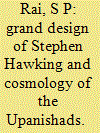

|
|
|
|
|
| Summary/Abstract |
Stephen Hawking was born in 1942 on the anniversary of Galileo’s death. He holds Sir Isaac Newton’s chair as Lucasian Professor of Mathematics at Cambridge University and is widely regarded as one of the most brilliant theoretical physicists since Einstein
|
|
|
|
|
|
|
|
|
|
|
|
|
|
|
|
| 8 |
ID:
141390
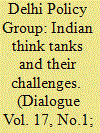

|
|
|
|
|
| Summary/Abstract |
India is ranked fifth on the list of countries with the highest numbers of think tanks, a surprising statistics given that most Indian think tanks are less than twenty years old. That such a large number of think tanks have been created in two decades is a tribute to the vitality of Indian civil society. However, the quality of Indian think tanks is highly uneven, and the obstacles they face are considerable.
|
|
|
|
|
|
|
|
|
|
|
|
|
|
|
|
| 9 |
ID:
141384
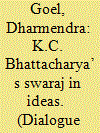

|
|
|
|
|
| Summary/Abstract |
Only rarely do we in India ever take other’s work any more seriously than passing amusement: given this, I am glad that the guest editors have given me an opportunity to present publicly my response to Krishna Chandra Bhattacharya’s (KCB's) Swaraj in Ideas.
|
|
|
|
|
|
|
|
|
|
|
|
|
|
|
|
| 10 |
ID:
141381
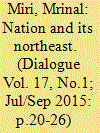

|
|
|
|
|
| Summary/Abstract |
The magnitude of the cultural diversity of the northeast almost defies imagination. Perhaps there is no comparable geographical area in the world which is home to cultural diversity of this magnitude. The linguistic diversity of the region is an inalienable part of this cultural diversity. Difficult as it is to individuate languages - (Is there one Bengali language or is there a cluster of fairly distinct languages individuated as a single language for a variety of reasons?) – there may be – on a fairly stringent count - close to two hundred languages spoken in the northeast. Many of these languages are on the UNESCO list of ‘endangered’ languages. Although, the number of languages may not quite coincide with the number of cultures, because a single culture can frequently embrace considerable linguistic variations, languages that are, in very large measure, independent of each other (e.g. Bhojpuri and Khasi), embody distinct cultures.
|
|
|
|
|
|
|
|
|
|
|
|
|
|
|
|
| 11 |
ID:
141379
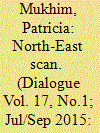

|
|
|
|
|
| Summary/Abstract |
The judiciary has been on the upswing and taking suo-moto notice of executive failures or malafide intent on the part of governments. Whether we take the VYAPAM scam in Madhya Pradesh, the landmark National Green Tribunal crackdown on environmental degradation through mining activities, deforestation and other forms of pollution; the Neer Mahal case of Tripura where the court has ordered the Government of Tripura not to encroach on heritage property which is also a private property and many more, the courts have played a pro-people role.
|
|
|
|
|
|
|
|
|
|
|
|
|
|
|
|
| 12 |
ID:
141392


|
|
|
|
|
| Summary/Abstract |
The Centre for Policy Studies is an institution committed to a serious study and comprehension of the classical Indian ideas and institutions in the context of the current reality of India. The Centre grew out of the passionate concern of a few bright scientists and engineers with the inadequacy of the practice of sciences and technologies in India. Their concern arose mainly from a strong feeling that the practice of the sciences and technologies in India had little resonance with the Indian tradition of different sciences and technologies or with the current situation and problems of India, and consequently these disciplines failed to develop an internal discipline and rigour of their own on the one hand and a significant stake in the economy and society on the other. This concern later expanded to include other fields of social and academic endeavour, especially history and social sciences.
|
|
|
|
|
|
|
|
|
|
|
|
|
|
|
|
| 13 |
ID:
141394


|
|
|
|
|
| Summary/Abstract |
The Center for Study of Science, Technology and Policy (CSTEP) is an Indian not-for-profit research organisation incorporated in 2005 u/s 25 of The Companies Act, 1956. As one of the largest think tanks in South Asia, its vision is to enrich the nation with technology-enabled policy options for equitable growth. CSTEP has grown to become a multi-disciplinary policy research organisation in the areas of Energy, Infrastructure, Security Studies, Materials, Climate Studies and Governance.
|
|
|
|
|
|
|
|
|
|
|
|
|
|
|
|
| 14 |
ID:
141388


|
|
|
|
|
| Summary/Abstract |
There has been a proliferation of think tanks in India in the recent years. According to a recent estimate by the Think Tanks and Civil Societies Program (TTCSP) at the University of Pennsylvania, there are192 think tanks in the country as against 1830 in USA, 429 in China, 287 in UK and 194 in Germany. It is a sad commentary on the quality of our think tanks that only six of them figure in the top 150. These are: the Centre for Civil Society (CCS, rank 50), Institute for Defence Studies and Analyses (IDSA, 100), Indian Council for Research on International Economic Relations (105), The Energy and Resources Institute (TERI, 107), Observer Research Foundation (ORF, 114) and Development Alternatives (129)
|
|
|
|
|
|
|
|
|
|
|
|
|
|
|
|
| 15 |
ID:
141387
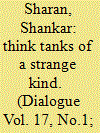

|
|
|
|
|
| Summary/Abstract |
When the first government led by the BJP was established at the centre in 1998, there was a spurt in establishing think tanks, presumably of a nationalist or Hinduist kind. With time it went to an embarrassing level as many Union ministers helped to create their individual think tanks. This apart from various trusts, memorial fund and foundations started by middle level BJP-RSS functionaries. Most of them also quickly applied to the government for allotting land and funds for their respective foundations. It is futile to research as to how many were registered during those years or since then, what they received as government grant, etc. Suffice to say that the very meaning of a think tank was quite eluded most of them.
|
|
|
|
|
|
|
|
|
|
|
|
|
|
|
|
| 16 |
ID:
141389
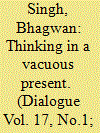

|
|
|
|
|
| Summary/Abstract |
We may admit it or not, but we have gradually become intellectual parasites of the West. Most of the field work in the Third World countries is undertaken by western countries and the scholars of the Third World depend on them without suspecting the intent of the authors, their selection and presentation of data and even conclusions drawn. In our haste to “CATCH UP WITH THE WEST,” we did not learn from the West, but emulated it, and in our desperation became its shadows – neither equal, nor different nor self-sustaining. Information in possession of the West is a tool for dominating the rest of the world, rather than understanding it. In ideal epistemological estimation, western literati is more ill-informed and indoctrinated than we ourselves are.
|
|
|
|
|
|
|
|
|
|
|
|
|
|
|
|
| 17 |
ID:
141386
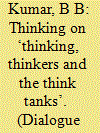

|
|
|
|
|
| Summary/Abstract |
The institution of a “think tank” is something new for India. We had thinkers, but not the think tanks. Our society always placed highest trust on its thinkers and their written words. This was, because ‘thinking’ in this country was a most rigorous process. It lacked self-centrism; for an Indian thinker, there was no conflict between the interest of the society (paramarth) and self-interst (swartha) of the thinker. The thought used to emerge from deep study (adhyayan), deep and intense thinking (manana) and contemplation (nididhyasan). Thinking was not only a rigorous, but also an open process. As the Rig-Veda said: ‘Let the noble thoughts come to us from every side’ (A no bhadrah kratavo yantu vishvatah; Rig 1.89.1), the noble thought from anybody and anywhere was welcomed in this country. The people’s trust in its thinkers was, any way, not a misplaced one; they did not feel deceived. The situation, however, drastically changed, when India was colonized. The colonizers came with a “true” ideology, which declared this country’s religion and culture “untrue.” They came with the “light” to remove our “darkness” and assumed the self-assumed “Whiteman’s Burden” to educate and civilise us. Colonial masters were expert myth-makers, which our English-educated intellectuals are still parroting. The myths and lies strengthened the colonial forces; they became excellent tools of social divide.
|
|
|
|
|
|
|
|
|
|
|
|
|
|
|
|
| 18 |
ID:
141393
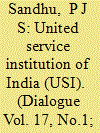

|
|
|
|
|
| Summary/Abstract |
The United Service Institution of India (USI) was founded in 1870 by a soldier scholar, Colonel (later Major General) Sir Charles MacGregor. It was established for the furtherance of interest and knowledge in the art, science and literature of National Security in general and of the Defence Services in particular. In order to ensure its autonomy, it was registered as a ‘Society’ in 1874 and continues to be so. Post partition of the Indian subcontinent in August 1947, the Institution continued to function as the United Service Institution of India and Pakistan for almost a year, till Pakistan disassociated itself in 1948 and the Institution reverted to its original name – USI of India.
|
|
|
|
|
|
|
|
|
|
|
|
|
|
|
|
| 19 |
ID:
141380


|
|
|
|
|
| Summary/Abstract |
In diplomacy and politics there are only interests and no friends or enemies they say. This time worn dictum of statecraft deserves a closer look in the present day Manipur.
|
|
|
|
|
|
|
|
|
|
|
|
|
|
|
|
|
|
|
|
|